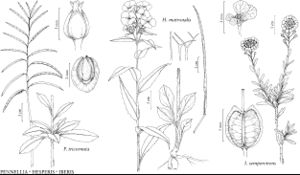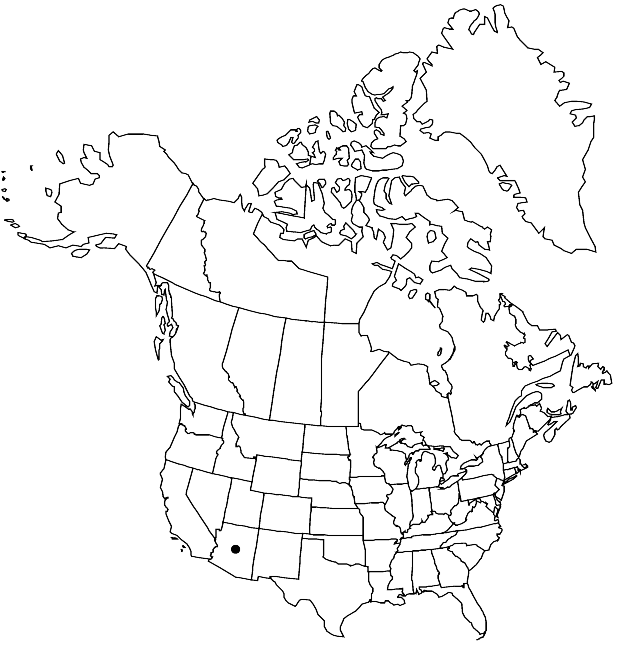Difference between revisions of "Pennellia tricornuta"
Novon 11: 339. 2001.
FNA>Volume Importer |
imported>Volume Importer |
||
| (6 intermediate revisions by 2 users not shown) | |||
| Line 7: | Line 7: | ||
|year=2001 | |year=2001 | ||
}} | }} | ||
| − | |basionyms={{Treatment/ID/ | + | |basionyms={{Treatment/ID/Basionym |
|name=Arabis tricornuta | |name=Arabis tricornuta | ||
|authority=Rollins | |authority=Rollins | ||
| + | |rank=species | ||
| + | |publication_title=J. Wash. Acad. Sci. | ||
| + | |publication_place=29: 478. 1939 | ||
}} | }} | ||
|synonyms= | |synonyms= | ||
| Line 27: | Line 30: | ||
|distribution=Ariz. | |distribution=Ariz. | ||
|discussion=<p>Of conservation concern.</p><!-- | |discussion=<p>Of conservation concern.</p><!-- | ||
| − | --><p>Pennellia tricornuta is known from Cochise, Pima, and Santa Cruz counties. It was recognized by R. C. Rollins (1941, 1993) under Arabis, but as shown by Price, Bailey & Al-Shehbaz and by S. Fuentes-Soriano (2004), it clearly belongs to Pennellia.</p> | + | --><p><i>Pennellia tricornuta</i> is known from Cochise, Pima, and Santa Cruz counties. It was recognized by R. C. Rollins (1941, 1993) under <i>Arabis</i>, but as shown by Price, Bailey & Al-Shehbaz and by S. Fuentes-Soriano (2004), it clearly belongs to <i>Pennellia</i>.</p> |
|tables= | |tables= | ||
|references= | |references= | ||
| Line 36: | Line 39: | ||
-->{{#Taxon: | -->{{#Taxon: | ||
name=Pennellia tricornuta | name=Pennellia tricornuta | ||
| − | |||
|authority=(Rollins) R. A. Price | |authority=(Rollins) R. A. Price | ||
|rank=species | |rank=species | ||
| Line 51: | Line 53: | ||
|publication year=2001 | |publication year=2001 | ||
|special status= | |special status= | ||
| − | |source xml=https:// | + | |source xml=https://bitbucket.org/aafc-mbb/fna-data-curation/src/2e0870ddd59836b60bcf96646a41e87ea5a5943a/coarse_grained_fna_xml/V7/V7_901.xml |
|tribe=Brassicaceae tribe Halimolobeae | |tribe=Brassicaceae tribe Halimolobeae | ||
|genus=Pennellia | |genus=Pennellia | ||
Latest revision as of 23:36, 5 November 2020
Stems simple or few from base, 1.5–9 dm, pubescent proximally, trichomes simple and long-stalked, 2–3-rayed. Basal leaves usually persistent; petiole 0.5–3 cm; blade oblanceolate, 3–9 cm × 3–23 mm, margins dentate, surfaces pubescent, trichomes stalked, 2–4-rayed. Cauline leaves (distal) sessile; blade linear, 2.7–7.5 cm × 1–9 mm, surfaces glabrous or sparsely pubescent. Racemes secund, 2–6 dm in fruit. Fruiting pedicels ascending, arcuate, 7–11 mm. Flowers: sepals purple or green, oblong, 2.3–4 × 0.8–2.1 mm, (subequal); petals lavender apically, spatulate, (2.7–)3.3–4.5 × (0.5–)1–1.5(–1.7) mm, (equal); filaments (1.7–)2–2.8(–3.3) mm; anthers 0.9–1(–1.3) mm. Fruits divaricate-ascending, straight or curved, 3.3–6.5 cm × 2–2.5 mm, latiseptate; valves glabrous; septum opaque; ovules 40–50 per ovary; style obsolete to 0.2 mm. Seeds uniseriate, flattened, winged, oblong, 2.4–2.8 × 1.2–1.9 mm; seed coat not mucilaginous when wetted; cotyledons accumbent.
Phenology: Flowering Jul–Sep.
Habitat: Steep rocky slopes, under pines, road and sand banks
Elevation: 1300-2800 m
Discussion
Of conservation concern.
Pennellia tricornuta is known from Cochise, Pima, and Santa Cruz counties. It was recognized by R. C. Rollins (1941, 1993) under Arabis, but as shown by Price, Bailey & Al-Shehbaz and by S. Fuentes-Soriano (2004), it clearly belongs to Pennellia.
Selected References
None.

